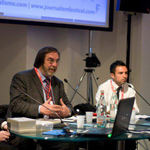Revolts, media and immigration in the French context
 Interview with the author of the book Vincenzo Sassu
Interview with the author of the book Vincenzo Sassu
Vincenzo Sassu has been volunteer at the International Journalism Festival in Perugia for the last couple of years. In 2011’s edition he is back as a speaker and author of the book “Là-bas la Banlieue. Revolts, media and immigration in the French context”. He shared the essence of his book in a short interview.
What inspired your book?
“Là-bas la Banlieue. Revolts, media and immigration in the French context” is book, which I wrote in Paris while I was studying at the Sorbonne University. It was inspired from the need to understand what really pushed the French of immigration decent to protest in such a violent way against the central State.
What did you find during your work on the field?
I think Paris is really multicultural city, but when you go to the suburbs, you can find only people from the Arab and sub-Saharan countries. The social politics in France created sort of ghettos that French really don’t know and don’t care about. If you ask French people what is going in les Banlieues, in the suburbs, they will just say: “Je ne sais pas” (I don’t know).
What was the most memorable situation during your research?
When I was taking the bus form the ghettoes, the drivers were asking me: “What are you doing here? Tourists don’t come around. Here live only people from Africa.” And I remember one girl from migration background that said about the ghettos: “Here is really messy. I think that Africa is better.”
What kind of stereotypes did you face during your research?
I think the most important thing that shocked me is how difficult for this kind of people are to get a job or even to be invited for an interview for a position. If your name is Moussa or Foussa you have many times less opportunities not even to get a job but to get an interview. This is really bad, because people don’t find a way to live a decent live.
What lessons can Italy learn from the French immigration policies?
I think Italy should start to think about to be more multicultural. Until the 80s we didn’t have many immigrants but now the things are changing. So we can’t live without taking in the account that people from different regions are coming to Italy and they want to become Italian. But not undermined Italian, but really Italian, one that have the same rights as Italian people – to work and to be paid and to have a equal opportunities for a good way of living.
Dobriyana Tropankeva
